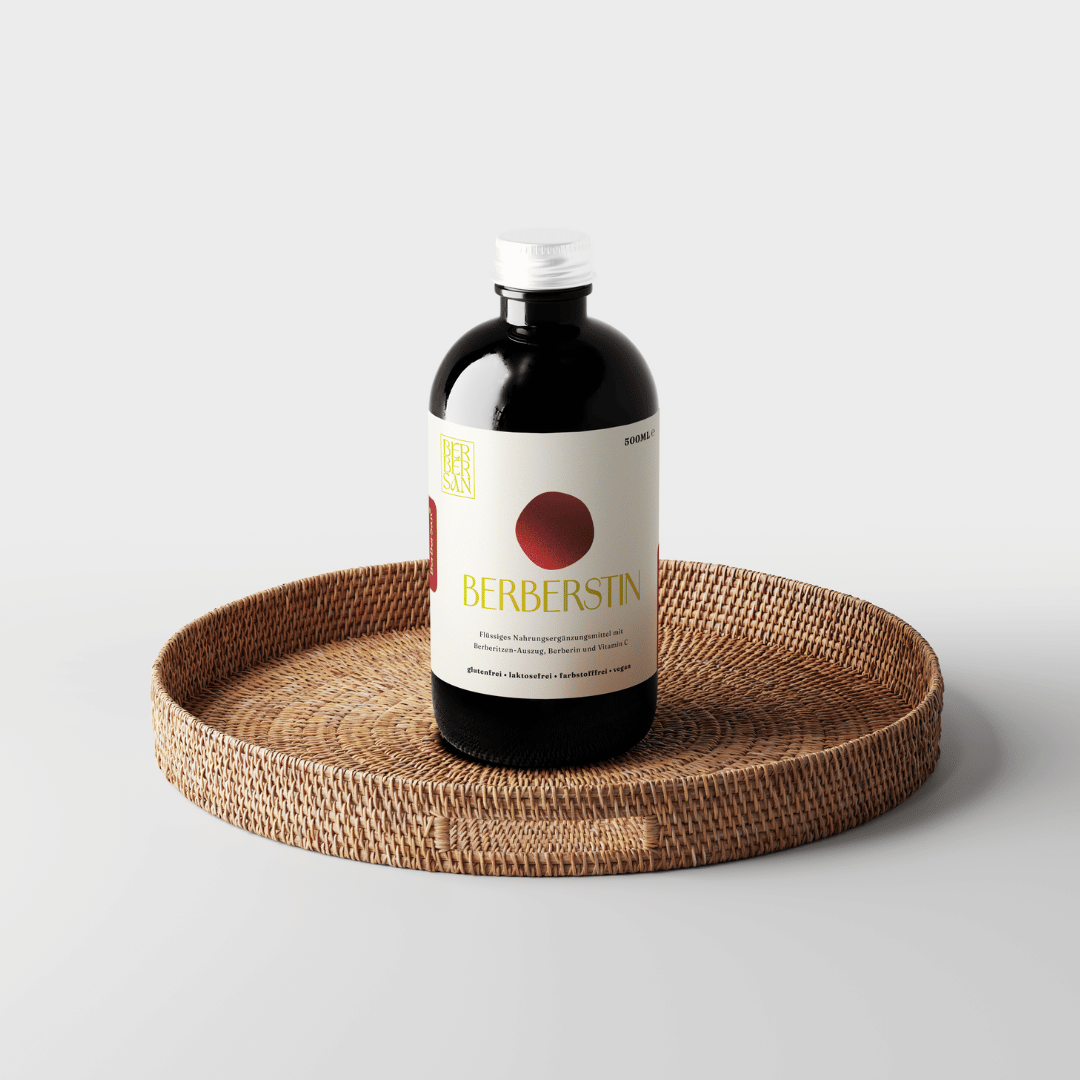We all know how important exercise is for our physical and mental health. Sport not only promotes cardiovascular health, but also increases general well-being, performance, and resilience to stress. But how can we further support our bodies—especially when it comes to shortening recovery times, optimizing muscle building, or preventing injuries?
This is where a plant substance comes into play that has gained increasing attention in recent years: berberine . As an active plant substance from the barberry, berberine was already known in traditional Chinese and Persian medicine – now it is becoming the focus of modern sports medicine research.
In this article, we will examine in detail what berberine can do, how it works in the body, and in which contexts it is of particular interest to athletes – from recreational athletes to professionals.
How does berberine work? – A look at the molecular mechanisms
AMPK – The cellular energy manager
A key mechanism of action of berberine is the activation of AMPK (AMP-activated protein kinase). This enzyme functions like an energy sensor in our cells. Whenever energy reserves are low—for example, after intense exercise—AMPK becomes active and ensures that the body produces energy efficiently.
AMPK increases the burning of fatty acids, increases glucose uptake in muscle cells (even without insulin), and activates the production of new mitochondria, the "powerhouses of the cell." In short, berberine puts the body into a state at the cellular level that could enhance training effects, accelerate fat burning, and promote endurance performance.
mTOR – The Muscle Builder
In contrast, mTOR (mammalian target of rapamycin) is a protein essential for cell growth and muscle building. While intense strength training activates mTOR, excessive AMPK activation can inhibit mTOR. Therefore, there is debate about whether a very high dose of berberine in the immediate post-workout phase could inhibit muscle building—at least theoretically.
Studies such as those by Lee et al. (2010) show that berberine promotes protein degradation in cell cultures. On the other hand, studies on insulin-resistant mice (e.g., Chen et al. 2020) demonstrate that berberine even inhibits muscle breakdown and improves muscle mass. The effect therefore appears to be context-dependent: In metabolically disturbed states, berberine has a stabilizing effect, while in healthy cells, an excessive AMPK boost could be counterproductive—which argues for targeted application.
What do the studies say? – Scientific findings at a glance
Performance and body composition
The study by Wu et al. (2025) on obese mice is groundbreaking: Animals treated with berberine showed significantly greater muscle strength, higher muscle mass, and simultaneously lower body fat. The researchers attribute this to increased mitophagy—a process in which damaged mitochondria are broken down and replaced with functional ones.
Ghorashi et al. (2019) also investigated the combination of exercise and berberine – this time in humans. Older, overweight men particularly benefited from the combination: blood lipid levels improved more than with exercise alone, as did the inflammatory marker CRP. This suggests that berberine can metabolically enhance exercise effects – especially in populations with suboptimal starting conditions.
Regeneration and oxidative stress
Intense training sessions place the body under oxidative stress – a condition that can damage cellular structures and is partly responsible for muscle soreness and prolonged recovery times. This is where berberine comes in: Chen et al. (2016) showed that mice pretreated with berberine exhibited significantly less oxidative damage in their heart muscle after an exhaustion test.
Another study by Ramezani et al. (2020) underscores this effect: Diabetic rats that exercised while receiving berberine showed significantly higher antioxidant enzyme activity than animals that only exercised. This suggests that berberine promotes cellular recovery after exercise—a potential benefit for athletes who frequently undergo high levels of exercise.
Metabolism: insulin sensitivity and fat burning
Berberine is no stranger to diabetology—and rightly so. A meta-analysis by Ye et al. (2021) confirms its effect on key metabolic parameters: blood glucose, HOMA index (insulin resistance), triglycerides, and LDL cholesterol decreased significantly, while HDL increased.
For athletes, this means better glucose utilization, more stable energy flow, and more efficient fat metabolism—factors that are important in both strength and endurance training. Zhang et al. (2019) even showed that berberine increases the activity of brown adipose tissue (BAT)—a tissue that actively burns calories and increases basal metabolic rate.
Rehabilitation & tissue protection
Zhou et al. (2021) demonstrated in an in vitro model that berberine protects tendon cells from the side effects of glucocorticoids. These drugs are often used to reduce inflammation in injuries, but can weaken connective tissue. Berberine protected the cells, promoted collagen production, and activated regenerative signaling pathways. This also makes it interesting for the postoperative or injury-related rehabilitation phase.
Application and safety: What should athletes consider?
The evidence supports a moderate, targeted use of berberine – especially:
On non-training days or with a time interval after the workout to avoid possible inhibition of mTOR
In cases of metabolic weakness or increased tendency to inflammation , e.g. in older athletes or those in build-up/reduction phases
To support regeneration after intensive exercise or during rehabilitation phases
Berberine is available over the counter in Europe as a dietary supplement. Typical dosages range from 500–1500 mg/day. Side effects mostly affect the gastrointestinal tract (flatulence, diarrhea) and are rare. Caution is advised when taking medications at the same time, as berberine can inhibit certain enzymes (CYP3A4).
Conclusion
Berberine isn't a miracle cure—but it's an exciting building block for athletes who want to scientifically support their training. Studies suggest that berberine:
improves metabolic efficiency
reduces oxidative stress
Reduces inflammation
Muscle strength and function stabilized
can promote the regeneration process
Berberine could be an effective, natural tool, especially for athletes with increased metabolic stress, in old age or during recovery after injuries.
Disclaimer
This blog post is for general information purposes only and does not constitute medical advice. The content presented is based on current scientific studies but does not replace individual medical advice. Berberine is a dietary supplement, not a drug. If you have any health concerns, pre-existing conditions, or are currently taking medication, always consult a healthcare professional before starting use.
🏋️♂️ TLDR: Berberine in sports – scientifically sound & practically relevant
Exercise is important. For health, vitality, and mental strength. But exercise also means exertion. Muscles need regeneration. The body needs balance. And that's exactly where berberine comes in.
In recent years, berberine has evolved from a traditional medicinal product to an interesting tool in sports science. Recent studies show:
- 💪 Improved muscle strength and function through mitophagy activation (Wu et al., 2025)
- 🔥 Accelerated fat burning and increased insulin sensitivity (Ye et al., 2021)
- 🧬 Anti-inflammatory & faster recovery after training (Ramezani et al., 2020)
- 🦴 Supporting tissue regeneration during rehabilitation phases (Zhou et al., 2021)
The effects are mainly based on the activation of AMPK , a cellular energy sensor that stimulates fat burning, glucose uptake and cellular recovery – ideal for active people and athletes.
🔗 Discover now: Berberine Juice BBS1
👉
View BerBerSan® BBS1 – 30-day course
🍶 The first berberine juice in the world, developed together with doctors and sports physiologists.
🧾 Note: This article is based on current scientific studies (2010–2025). It is provided for informational purposes only and does not replace medical advice. Please consult a medical professional if you have any questions about its use or if you have existing medical conditions.





